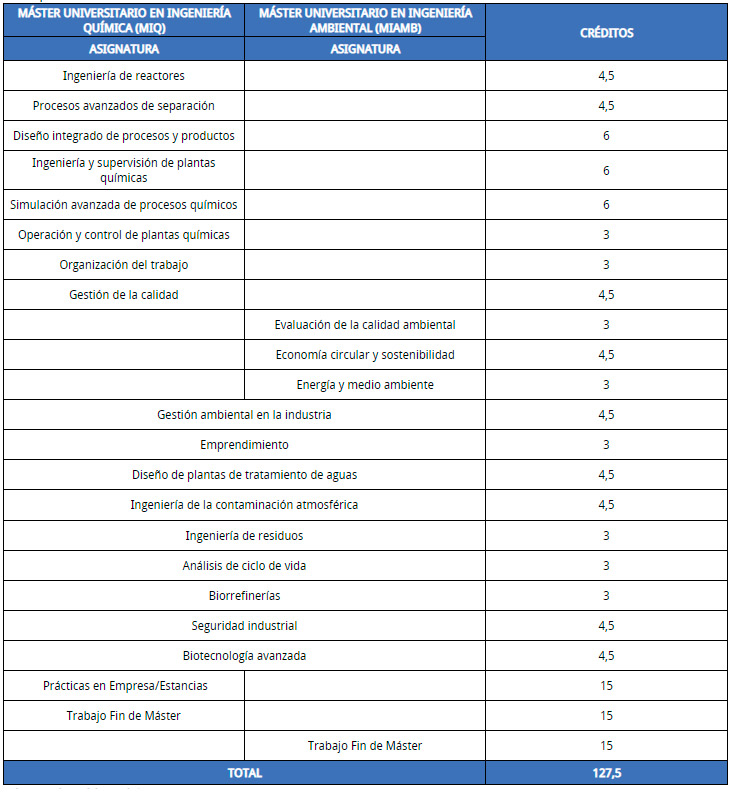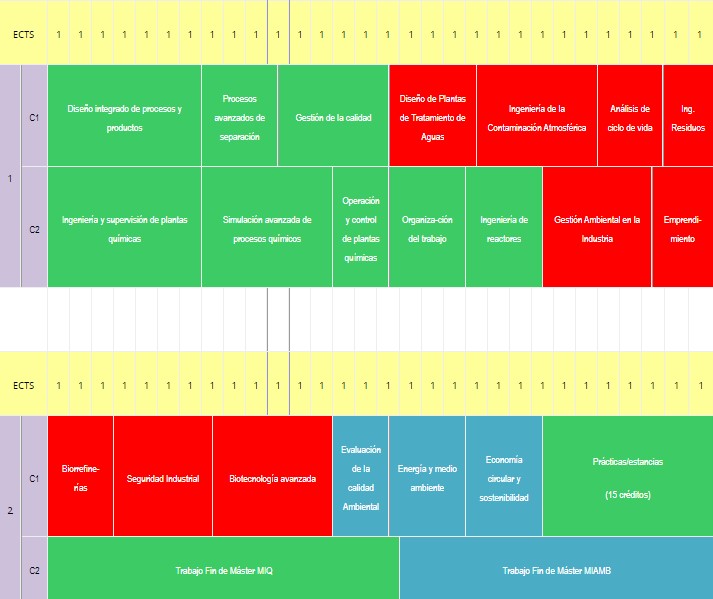Joint curricular itinerary for the double degree
- Description. A curricular itinerary is proposed to jointly study the Master's Degrees in Chemical Engineering (MIQ) and in Environmental Engineering (MIAMB), based on the complementarity between both degrees.
- Purpose. The completion of the itinerary leads to obtaining the two degrees that compose it.
- The teaching programming has the following characteristics:
- For the Master in Chemical Engineering, 45 ECTS of the mandatory subjects will be taken.
- Of the optional module of the Master in Chemical Engineering, 15 ECTS will be taken through mandatory subjects of the Master in Environmental Engineering. This possibility appears as an option in the report of the Master in Chemical Engineering. The specific list of subjects to be taken is as follows:
- Design of water treatment plants 4.5
- Air pollution engineering 4.5
- Waste engineering 3
- Life cycle analysis 3
- Biorefineries 3
- Industrial safety 4.5
- Advanced biotechnology 4.5
- Circular economy and sustainability 4.5
- Energy and environment 3
- The subject “Environmental management in industry” (4.5 ECTS) is transversal to both Masters.
- The subject “Entrepreneurship” (3 ECTS) is common to both master's degrees, so only one of them will be taken.
- The rest of the mandatory subjects will be taken from the Master in Environmental Engineering (Evaluation of environmental quality, 3 ECTS).
- From the Internship and Stay Module of the Master in Chemical Engineering you will earn 15 ECTS. This module allows the mobility of master's students, initiation into research or incorporation into the professional world. It consists of the following options:
- Communication Techniques and Professional Skills: 5 credits
- Internships in companies or public institutions: up to 15 credits
- Stays in research laboratories of public organizations, universities or companies: up to 15 credits
- Subjects taken in mobility programs: up to 15 credits
- Complement to Master's Final Project completed in mobility programs: 15 credits
- The completion of two TFMs for the Double Master is contemplated, one for each degree (15 + 15 ECTS).
- It must be considered that the Master in Environmental Engineering includes a complement of training, which is the subject:
- Analysis and Design of Chemical Processes

- Number of credits in the itinerary. The total number of credits for the double Master's degree is 127.5 ECTS.
- Access. As access requirements, it will be required to comply with both the access requirements for the MIQ and those corresponding to the MIAMB, with the respective Academic Commissions retaining the powers over the assessment of candidates and the establishment of training complements to which the verification reports refer.
- Recommended entry profile. The double degree itinerary is aimed at students with previous training at the degree level in Chemical Engineering and Graduates in Industrial Chemical Engineering.
- Offer of places. In principle, they intend to offer 10 places for this double itinerary, a number that may be modified in subsequent courses depending on demand.
- Teaching organization.
- Groups. The MIQ subjects will be taken jointly with the students who continue the studies of said degree. Likewise, the MIAMB subjects will be taught jointly with the students taking this degree. The schedule of these master's degrees will be defined so that there are no schedule incompatibilities in the double degree.
- Academic bodies. Each degree will be managed by its corresponding Academic Commission, which in relation to admission to studies.
- Temporary programming of teachings. The following tables show the temporal programming of the different subjects, indicating:
- Green: Subjects to be taken at the MII.
- Blue: Subjects to be taken at MIAMB.
- Red: Common subjects.

Summary of the proposal (without leveling subjects)

*Includes 30 leveling credits to be taken according to previous training.
